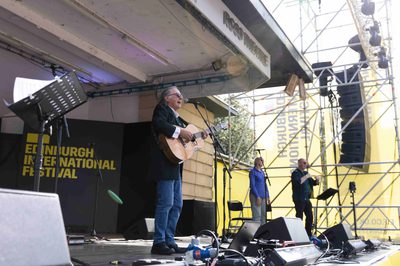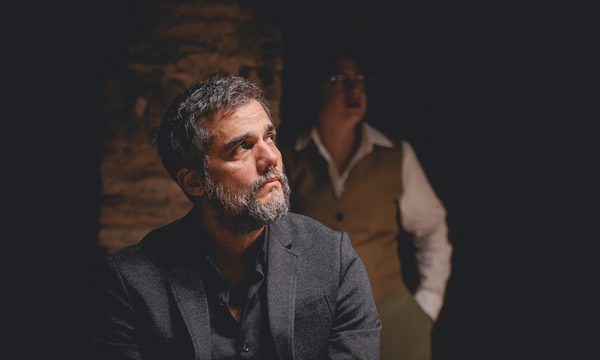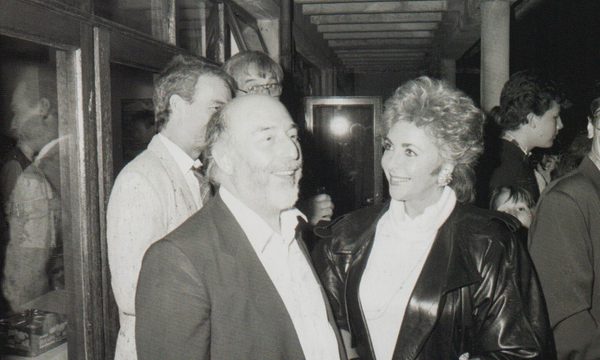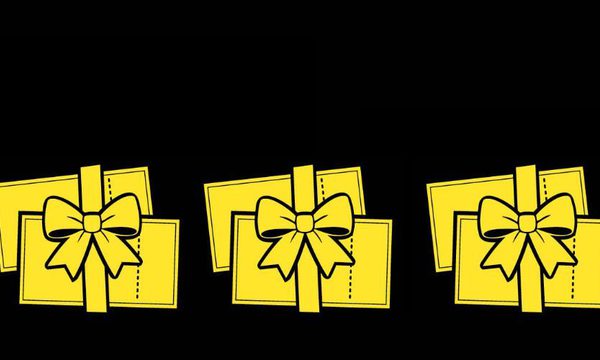
News Story
This August we invited Edinburgh to sing with us.
Joined by Scottish national treasure Dougie Maclean and some of Scotland’s best community choirs, we welcomed everyone to a free outdoor event to mark the start of our festival season.
In a first for the Festival, the concert featured two interpreters on stage, one interpreting the performances and one interpreting the presenter - a key component in making the concert truly inclusive.
One of those interpreters was Paul Whittaker OBE. A Deaf musician himself, Paul has dedicated much of his life to advocating for more support for D/deaf people to enjoy music. We caught up with Paul to understand more about the process behind preparing for such a unique event and what it’s like to interpret music as a Deaf musician.
Preparing for the big day
For those who weren’t there to experience The Big Singalong concert this August with Dougie MacLean, could you fill us in on your role at the event?
My role, along with my sister Anne, was to provide BSL interpretation for the event. This was actually the first big public event we have signed together and we loved it! Because of my deafness I struggle with interpreting speech, so we shared the workload on this occasion.
What is your process for preparing for a concert like this?
I read through the score and lyrics of the songs, work out what they mean, devise a translation and then marry that to the music, emotion and character of each song. There’s only so much you can prepare in advance though; live performance can be very spontaneous.
As a Deaf musician you feel the need to prove yourself all the time, and that level of pressure is still there with almost every job I do.
What is something that people may find surprising about the work that you do?
The amount of work involved! It’s remarkable how some people think you simply turn up on the day, get on stage and start signing. When signing classical music - sometimes with no lyrics - you really need to understand that piece of music. You have to a be musician, interpreter and performer all at once.

Paul with his sister Anne on stage with Dougie Maclean
© Jess ShurteMaking waves in the industry
As a Deaf person, what challenges did you experience while studying music?
When I was younger there a lot of prejudice and a widespread assumption that music was for hearing people only. Doing aural tests in music exams was stressful, and I was rejected by 12 universities because of my deafness. As a Deaf musician you feel the need to prove yourself all the time.
Where did your passion for advocacy begin?
I suppose it’s always been there as I’ve been Deaf all my life and had to fight to be allowed to do what I wanted. I was 12 when I had the idea of setting up a charity to support and encourage Deaf people to make and enjoy music, and ran that charity for 27 years. Part of that was about promoting access to music and theatre.
Let your music and your performance be the thing that people notice and applaud, not your deafness.
Is there still a misconception that D/deaf people can't enjoy music in the same way as a hearing person?
Yes, and I feel there always will be. There are numerous Deaf professional musicians and actors and performers active in the UK, so we’re more visible than we used to be, but deafness itself is still largely misunderstood.
What element of your job brings you the most joy?
I do enjoy the challenge of devising an interpretation, despite the stress and pressure. But more enjoyable is being able to bring the joy of music to people who for so long may have been denied it.
What advice would you give to young D/deaf performers who would like to pursue a career in the arts?
Work hard, study, practice, have passion and commitment. Absorb as much music as you can. Don’t take no for an answer. Let your music and your performance be the thing that people notice and applaud, not your deafness.


